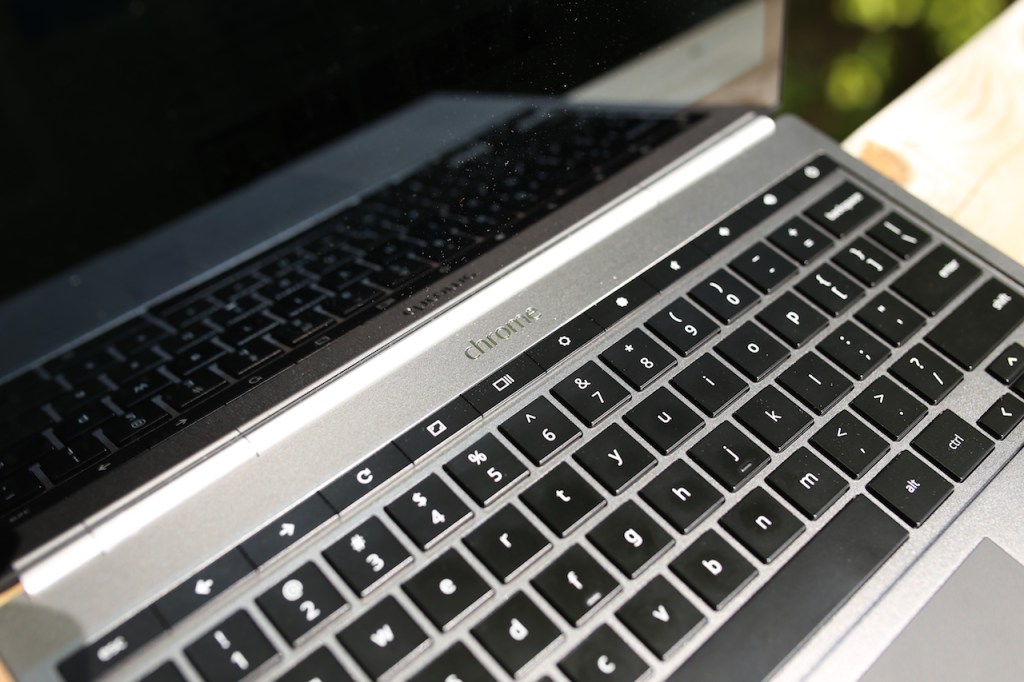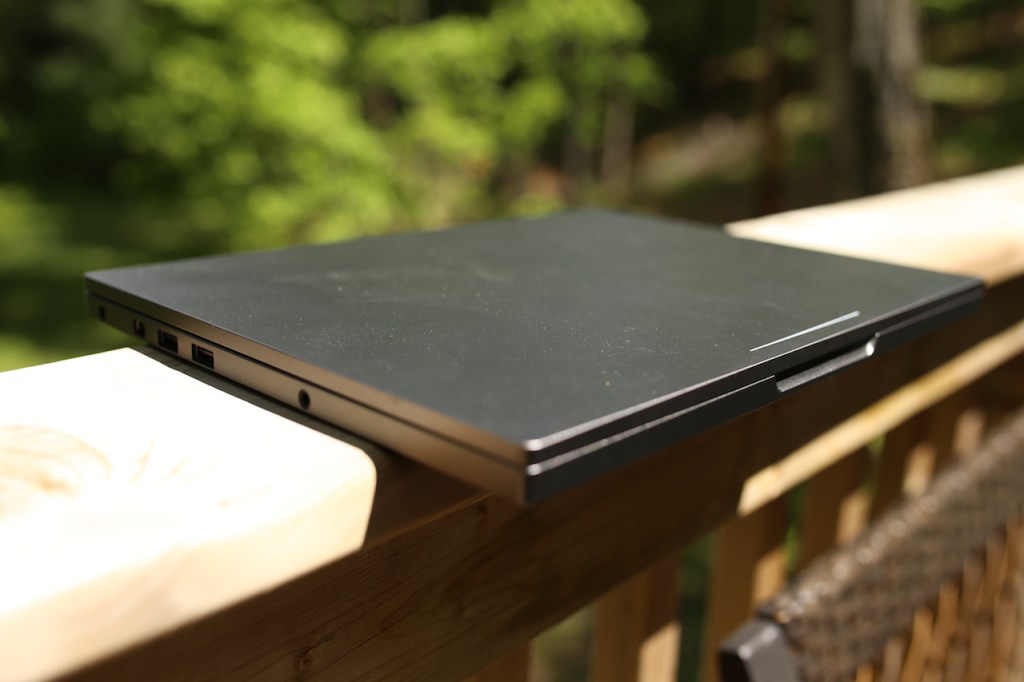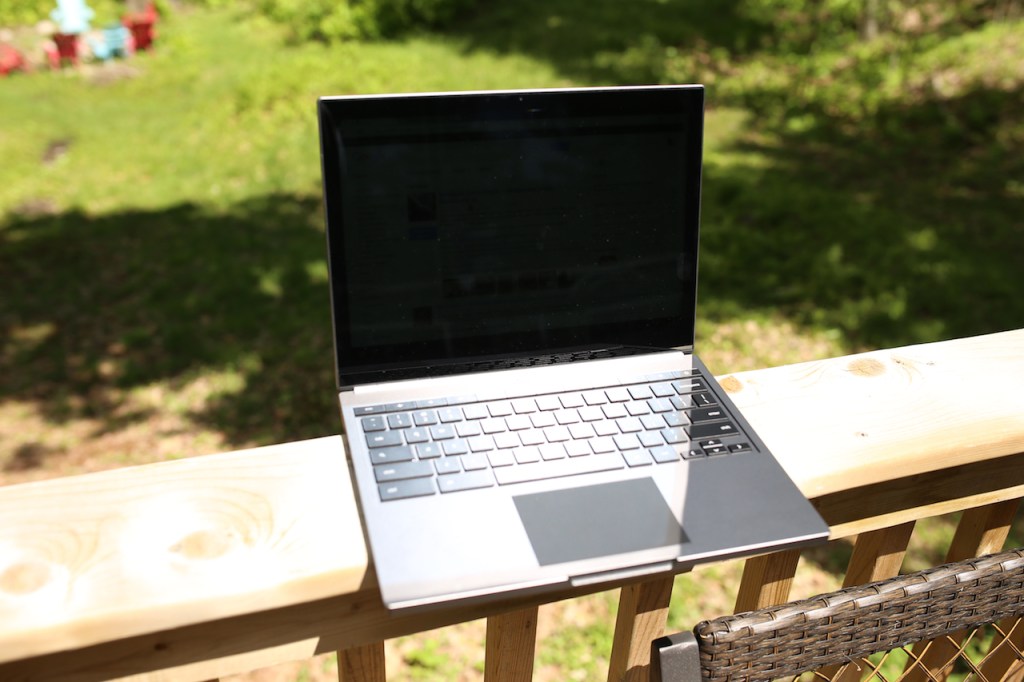Features:
- Ships with Chrome OS (generally requires an update to get to latest build)
- 2560 x 1700, 239 PPI display
- 32GB SSD
- 1.8GHz Intel Core i5 Processor
- MSRP: $1,299
Pros:
- Hardware is incredibly well-designed
- Fast boot, right into Chrome-based workflow
- Touch is nice when actually needed
Cons:
- Seems to leech battery quickly in sleep mode
- Still just Chrome
- Expensive
- Battery life could be better
The Chromebook Pixel is the Chromebook I'd pick as my personal Chromebook – if money was no option, and if I felt I really needed a Chromebook. It's an impressive beast, like a Bird of Paradise, but in the end a trained falcon would be a way better winged thing to own, since it could catch you some wild game, instead of just prancing around with its mesmerizing but fairly useless mating displays.
 While not comparable to a bird of prey, the Chromebook Pixel is a very impressive piece of hardware. The construction, which includes an anodized aluminum shell that has a dark slate finish, corners that are just slightly rounded for a more angular look than say a MacBook Pro, and clear attention to detail paid to the overall fit and finish that results in a final product you feel like putting on display in your home. The computer is solid, and it bears a pleasing weight to remind you, tipping the scales at 3.35 lbs (which is actually lighter than the 13.3-inch Retina MacBook Pro but feels more substantial somehow, perhaps owing to the smaller screen size.
While not comparable to a bird of prey, the Chromebook Pixel is a very impressive piece of hardware. The construction, which includes an anodized aluminum shell that has a dark slate finish, corners that are just slightly rounded for a more angular look than say a MacBook Pro, and clear attention to detail paid to the overall fit and finish that results in a final product you feel like putting on display in your home. The computer is solid, and it bears a pleasing weight to remind you, tipping the scales at 3.35 lbs (which is actually lighter than the 13.3-inch Retina MacBook Pro but feels more substantial somehow, perhaps owing to the smaller screen size.
The Chromebook Pixel also has a touch-sensitive, high-resolution display that beats the Retina MacBooks in terms of pixel density (which may have something to do with Google's naming choice here). The screen is admittedly gorgeous in ideal conditions, but ideal conditions are fewer and farther between for the Pixel's screen than for the Apple one. The color spectrum was skewed slightly yellow on my unit, and viewed at lower brightness legibility suffers. Also, if you think glare is a problem on your MacBook Pro or iMac, you're going to be amazed at how much worse it can get with the Pixel in bright lighting.
The touch aspect works well, and surprisingly I haven't had trouble with greasy mitts mucking up the screen so far. That's probably because I seldom actually reach out and touch it though. The movement is awkward from a typing position, and of limited use value in my opinion. But for those few times you do get the impulse to tap something, it's a very nice-to-have feature, if not a killer one. Speaking of touch, the Chromebook Pixel has one of the best trackpads currently available on a laptop, on par with Apple's extremely solid input pads.
Hardware aside, the Chromebook Pixel's main attribute is that it runs Google's Chrome OS. If you've not used Chrome OS before, you're probably not alone. But you also don't need to worry about a learning curve; this is just like using the Chrome browser on your Mac or Windows computer. Web apps are treated a little more like proper desktop apps, perhaps, but the extensions, the experience and pretty much everything else about it is just like using Chrome. Which is both a good and a bad thing.
It's good because it's simple, easy, and for a good chunk of people, it probably actually satisfies the majority of their needs. If you're a light computer user, making the browser the focus of an OS experience makes sense. But unfortunately for Chrome OS, tablets make almost as much, if not more sense for those users. Once you start requiring more than a tablet demands, your needs likely ramp up quickly, and then you'll feel the lack of dedicated apps like Skype and Adobe's Creative Suite products on the Chromebook pretty quickly. In other words, the Chromebook Pixel occupies a very thin sliver in terms of potential buyer needs, and there's likely massive demand on either side.
Google didn't make a mass market device with the Pixel, in the end. It made something that can stand as a shining example of what a Chromebook can be. That means that the Pixel is, in the end, something of a precious beauty, an exotic shape that won't likely fit either a round, square or triangle-shaped hole.
No. If you're a designer and you're using a Chromebook Pixel, you must be not very good at your job… or so good that I'm mystified at your abilities and you've evolved beyond the limitations of any physical tool. There are photo editing tools available for Chrome OS, and there's even an SD card slot (but don't try using ultra-high capacity ones like the 128GB I use as one of part of my go-to photography kit, it can't read those), but if you're a serious designer you'll sorely feel the lack of better, more mature tools. It can output to other screens, too with a Mini DisplayPort, but that just gives you double the browser space, and still limits you in terms of design software.
A lot of effort seems to be going into putting more design tools in the hands of web-based editors and creators, but we're not there yet. Maybe that's next after Adobe has moved to its Creative Cloud subscription-based model, but for right now, designers steer clear.
No. The Chromebook Pixel might be perfect for a founder who's building products based on the Google ecosystem and wants to kiss some extra ass, but really it isn't a great tool for an entrepreneur on the move. The main reason being that some absolutely crucial conferencing tools like Skype are still not in place on Chrome OS.
The other conceivable situation where this might work is if you're a web startup that's betting big on HTML5 and you want to really eat your own dogfood. But other laptops also offer Chrome, and a lot more besides, so why not have your dogfood and eat it, too? Not sure that metaphor actually works here but it reads well, so go with it.
No. This is a situation where it probably depends on what exactly it is you're programming. If you're building IFTTT recipes, for instance, a Chromebook Pixel is pretty exceptional. And if you're working on tweaking WordPress themes, then you can do everything you want to on the Pixel. But for anything beyond straightforward and simple text-based coding, you'll probably want to look elsewhere. I wouldn't, for instance, recommend coding iOS apps on a Chromebook Pixel. I probably wouldn't even recommend developing Chrome OS apps on a Chromebook, though you can apparently hack the computer to make it operate better as an everyday coding device.
This is a very good Chromebook. But the fact remains that it still feels like devices running Google's still-nascent Chrome OS need to be considered separately from other notebooks running OS X, Windows and even Ubuntu. The Pixel puts on an excellent show, has dazzling good looks and a stunning mating display, but it's far from an apex predator.



No hay comentarios:
Publicar un comentario